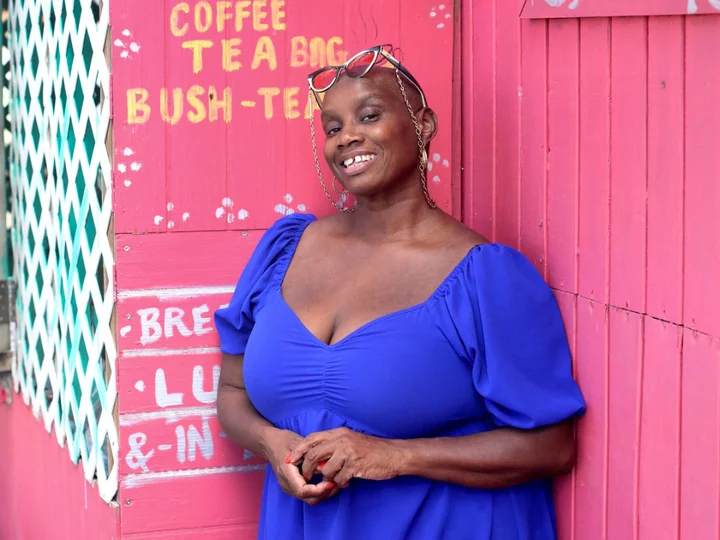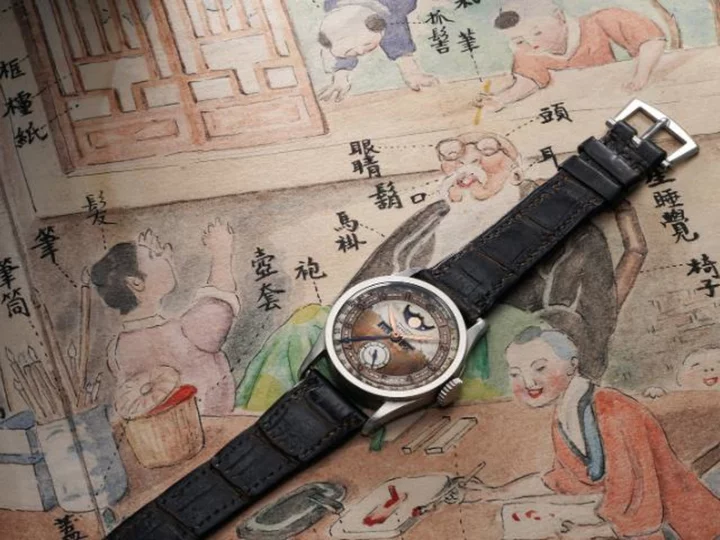
Caribbean-inspired coconut and lime cheesecake
The first sweet things I ever made were cheesecakes – they provide endless opportunities to explore flavour and are easy peasy!” says chef and Great British Menu host Andi Oliver. “This particular iteration brings together the creaminess of white chocolate with toasty coconut and vibrant lime to sublime effect. Not too sweet, just right.” Coconut and lime cheesecake Serves: 12 For the base: 100g gingernut biscuits 100g oat biscuits, such as Hobnobs 50g desiccated coconut 120g melted unsalted butter Pinch of salt For the filling: 280g full-fat cream cheese 4 tbsp coconut condensed milk 200ml coconut milk 150ml cream Grated zest and juice of 2 limes 100g white chocolate, melted For the topping: 1 fresh coconut 1 tbsp maple syrup Grated zest of 1 lime 1 fresh mango, peeled, cored, and diced 22-24cm fluted tart tin, base lined with baking parchment Method: 1. Put all the biscuits in a sealable food bag and bash them up to fine crumbs using a rolling pin or similar. Tip the crumbs into a bowl and mix with the toasted coconut, melted butter, and salt. Press into the bottom and sides of the tart tin and chill in the fridge for one hour or until set. 2. Combine all the filling ingredients, apart from the chocolate, in a large mixing bowl. Beat together using an electric hand whisk until smooth and slightly thickened. Mix through the melted white chocolate. Spoon the filling on top of the set base and chill for a couple of hours in the fridge until set (do note that this cheesecake has quite a soft-set finish). 3. Meanwhile, preheat the oven to 180C fan. 4. Crack open the fresh coconut and peel off flakes of the flesh using a vegetable peeler. You want about two handfuls in total. Toss the flakes in the maple syrup and half of the lime zest on a baking tray, then toast in the preheated oven for around 10 minutes until crisp. Leave to cool, then top the cheesecake with the toasted coconut. 5. Mix together the diced mango and remaining lime zest and serve a little spoon of this alongside slices of cheesecake, or pile it on top of the cheesecake as well. Recipe from ‘The Pepperpot Diaries: Stories From My Caribbean Table’ by Andi Oliver (published by DK, £27; photography by Robert Billington). Read More What is coronation chicken? The story of the royal recipe and how to make it Easy coronation chicken pie recipe chosen by Mary Berry Andi Oliver on turning 60 and channeling her anger into power Andi Oliver: Earl Grey tea bags are a gamechanger for barbecue chicken Three one-pot recipes for washing up hater A coronation sherry cherry trifle recipe fit for a king
1970-01-01 08:00

Angelina Jolie shares tribute to late mum and urges women with family cancer history to get checked
Angelina Jolie has urged women with a history of cancer in their family to “look after” themselves and “take mamograms, blood tests and ultrasounds”. The actor posted a touching tribute to her late mum on Instagram for what would have been her 73rd birthday. Marcia Lynne ‘Marcheline’ Bertrand – also an actor – died of ovarian cancer in 2007, after also being diagnosed with breast cancer. Jolie underwent a prophylactic double mastectomy in 2013, because she carries a gene called BRCA1 that significantly increases the odds of developing breast or ovarian cancer. The 47-year-old posted: “[My mother] passed away 15 years ago after a long struggle with breast and ovarian cancer”. “In June, I will be a month away from the age when she was diagnosed. I have had preventive surgeries to try to lessen the chances but I continue to have check ups. “My mom loved Hendrix. And would always sign her letters Kiss the Sky. It took on new meaning after she passed. “Sending my love to those who have also lost loved ones and strength to those who are fighting at this very moment for their lives and the lives of those they love. “And to other women, please take the time to look after yourself and go for your mammograms and blood tests or ultrasounds, particularly if you have a family history of cancer.” What the experts say Ovarian cancer affects the two ovaries that store eggs. Its symptoms are often overlooked. According to Target Ovarian Cancer, the four main symptoms are persistent bloating; pelvic or abdominal pain; feeling full or a loss of appetite and an increased need to urinate. “The term bloating is often used to describe a feeling of fullness in the tummy, which can often be associated with the lower abdomen looking swollen,” said Dr Susanna Unsworth, women’s health expert and in-house gynaecology expert for Intimina. “Bloating is often a consequence of bowel issues, but it is also recognised as one of the potential symptoms of ovarian cancer. “Ovarian cancer has been described as a ‘silent killer’ as the symptoms can often be mild and may go unnoticed in the early stages of the disease,” she added. “By the time someone consults with a doctor, the cancer may have already become quite widespread. Research done in 2021 by CoppaFeel! found that one in seven women in the UK will be affected by breast cancer in their lifetime, and one in nine in Ireland. According to the NHS website, you should see your GP if you find a new lump, thickened skin, a change in the size or shape of your breasts, nipple fluid or discharge, lumps or swelling in your armpits, a change in skin texture or nipple appearance or a rash like eczema. Read More Charity boss speaks out over ‘traumatic’ encounter with royal aide Ukraine war’s heaviest fight rages in east - follow live Georgia Toffolo on Jungle exit: ‘You can show your acne and be beautiful at the same time’ Eurovision: Liverpool’s trendsetting musical icons 14 clever ways to make small rooms look bigger
1970-01-01 08:00

Thailand Says Chinese Tourists On Track to Reach Pre-Covid Level
Chinese tourist arrivals to Thailand are on course to hit 1 million a month each from October, a
1970-01-01 08:00

Woman in ‘living hell’ with brain slipping down her spine after ice-skating accident
A 25-year-old who has been mostly bed bound by a painful condition that is causing her brain to slip down her spine is pleading for help to raise funds for lifesaving treatment in the US to stabilise her skeleton. Desperate to raise the £200,000 she needs, Emily Balfour, from London, said she will eventually face permanent disability and is at risk of paralysis if she does not receive PICL, a procedure that injects stem cells into the spine through the back of the mouth. An ice-skating accident at the age of 14 flagged the alarming conditions that cause Emily to now live with “relentless levels of pain”. She was diagnosed with Ehlers-Danlos syndromes (EDS), a collection of rare conditions affecting the connective tissues that make her joints unstable and prone to dislocation, as well as craniocervical instability (CCI), meaning the area where her skull and spine meet is dangerously unstable. Emily also has Chiari malformation, which means the lower part of her brain has herniated and is pushing down through the top of her spinal column. “My health is continuing to deteriorate but I still haven’t managed to raise enough money to get the treatment I need in America,” Emily said. “It would be lifesaving for me and, unless I get the treatment, my life is on pause and stagnated, I’ve become largely bed bound. “And this issue doesn’t just affect me, there are so many people with this condition who are struggling to get funds for treatment abroad. Money is the barrier for us being able to live our lives.” In 2011, Emily was first diagnosed with EDS after an ice-skating accident resulted in a trip to the doctors. I want to keep my sense of agency but it’s getting more and more difficult. Emily Balfour Once a sporty and active teen, Emily is now confined to her bed most days. Due to Chiari malformation, Emily’s brain is pushing down through the top of her spinal column and she said medical specialists have informed her that some of her brain is no longer in her skull. Emily once had dreams of working in film, but she is unable to complete her degree and is also not able to work while she struggles with her health. She said: “I’m not able to participate in life, I’m unable to work and I keep having to delay the completion of my degree. “I have limited vision, I can’t see out of my left eye and I have recently dealt with limb paralysis.” Earlier this year, Emily was rushed to hospital after her left arm became paralysed and swollen. She said: “It looked like a dead person’s arm, I feared I’d never regain mobility of it. “It turned out I was struggling with blood flow to the arm, and I’ve regained limited use of my arm, but I’m high risk of it happening again. “I’ve seen people with these conditions lose function of their arms completely and that obviously concerns me because I live by myself. “I want to keep my sense of agency but it’s getting more and more difficult.” Emily said her brainstem has been damaged to the point where her body is not functioning and she suffers daily from extreme fatigue, periods of paralysis, and loss of vision. It’s incredibly frustrating and I have to accept that I can’t live the life I thought I would. Emily Balfour As a result, Emily now finds herself largely bed bound, is regularly in and out of hospital and suffers from excruciating symptoms which threaten irreversible physical disability and potentially death. Innovative treatment in the US to stabilise her skeleton will be life-changing for Emily, but it comes at a cost. She hopes to raise £200,000 for multiple stem cell treatments, medical care and accommodation in Colorado, USA, where she will undergo a procedure known as PICL to repair and strengthen the ligaments that keep her skull stable. She said: “I’m in relentless levels of pain and, the more activity I do where I’m moving my neck, the worse the pain is. “If I don’t get treatment then it’s looking likely that eventually I will lose the use of one or both of my arms. “The longer it goes on, I’m losing more and more years of my life.” Before her diagnosis, Emily had dreams of working in film, having attended the BFI Film Academy as a teen. She also had plans to travel after finishing her English degree, which is currently on hold. Emily said: “It’s incredibly frustrating and I have to accept that I can’t live the life I thought I would. “I’m seeing other people my age having fun and building their careers but until I get the PICL procedure, I’m stuck. “There are other people who are also in my situation and it’s not an easy journey but I just hope that these treatments will be easier to access closer to home so we can get back to living.” I just want to be able to complete my degree and have a normal life and not be stuck in this living hell. Emily Balfour Emily hopes more research into EDS will result in more treatment options becoming available. For Emily, she says the procedure will be a lifeline and enable her to start living again. “Getting treatment will change everything,” she said. “I wanted to write and make films, but I am now more interested in medicine and want to get a psychotherapy qualification and work in that field. “I used to be so passionate about movies and reading, but because of my brain and vision issues, I’m restricted to audiobooks now. I can’t even do basic things like watching TV, that once brought me so much joy. “I just want to be able to complete my degree and have a normal life and not be stuck in this living hell.” To donate to Emily’s fundraiser, visit: www.gofundme.com/f/urgent-treatment-for-emily. Read More Four ‘red flag’ bowel cancer symptoms that can show two years before diagnosis Mother left ‘looking like Freddy Krueger’ reveals first skin cancer warning sign Woman ‘can barely move her hands’ after years of gel nails Charity boss speaks out over ‘traumatic’ encounter with royal aide Ukraine war’s heaviest fight rages in east - follow live
1970-01-01 08:00

Nearly $100 Billion in Election Promises Carry Potential Economic Risks for Thailand
Thai politicians are trying to outdo each other, promising voters billions of dollars worth of relief and freebies
1970-01-01 08:00

Andi Oliver on turning 60 and channeling her anger into power
Andi Oliver was already whipping up cauliflower cheese at the age of seven, and could make a full roast dinner by the time she turned nine. So when she witnessed a home economics teacher pouring a packet of rice into a big, bubbling pan of water, leaving it to simmer then straining and rinsing it, she was puzzled to say the least. “I was like, ‘That’s not how you cook rice’. And I got kicked out of the lesson,” she says, chuckling at the memory. “I had to stand in the hallway. I was like, ‘What is she doing to the rice?'” Not that this incident derailed the culinary career of the 59-year-old chef, restauranteur and Great British Menu host, who was born in Kent and has lived in east London for 25 years. Oliver was taught to cook by her mother, who was born on the Caribbean island of Saint Kitts (her father hails from Antigua – the pair met in Leicester). Soon, she was in charge of dishing up dinner for herself and older brother Sean, who died of sickle cell anaemia in 1990, aged 27. “My mum was a teacher and my dad was off working and having philandering affairs, so when I came home from school I would make the tea for me and my brother.” Describing herself as a “latchkey kid”, Oliver doesn’t think she had a difficult childhood. “That’s just how it was,” she says, as warm and jovial during our chat as she is on TV. “I didn’t feel bad about it. I didn’t sit around wondering where my mummy was. It was just, that was life, that’s what you did, you got on with it.” Nor was she devastated when her parents eventually separated: “I was thrilled! I was delighted. They didn’t get on, they used to fight all the time. It was awful, so they were both much better when they weren’t together.” Oliver and her partner – restauranteur Garfield Hackett, with whom she shares daughter – the TV presenter – are still going strong after more than 27 years together. “The kindest man I know and my partner in life and all things” is how she describes Hackett in her inaugural cookbook, The Pepperpot Diaries. An ode to Caribbean cookery, as well as detailing essential eats, the book also chronicles three months Oliver spent in Antigua – a trip which started at Christmas 2019 and had to be extended (“the best luck in the world”) when lockdown began. How would the chef – known for her colourful outfits and infectious grin – describe the region’s cusine to the uninitiated? “The legacy in each island is very different,” she says. “But there are basic things like rice and peas, curry chicken and fried plantain, curry goat or goat water [a type of stew], fried fish. “One of the things I really hope [with this book] is that people start to think about that difference and celebrate it.” Even the classic titular dish – a slow cooked stew made with smoked beef and pork, veggies and beans – varies from island to island: “There’s a Guyanese pepperpot that’s a completely different dish to the Antiguan dish. And then they don’t really make pepperpot in Jamaica.” In her diary entries, the author doesn’t shy away from discussing the tragic history of the Caribbean, explaining how slavery influenced the islands’ food heritage. “You can’t really be in the Caribbean without thinking about those things,” Oliver says. “The legacy of that past, dark though it may be, is right there in your face.” And she’s keen to talk: “I think if you bring those things out into the light and discuss them we can divest ourselves of the pain of them and try to move forward in our lives.” Having experienced racism from a young age (“I’ve been told by people in England my whole life to ‘go home’, even though I was born here”), Oliver went through a “big angry phase” in her 20s. “When I was younger, my anger and my fury used to work against me quite a lot,” she reflects. “But now, as an adult woman who’s about to turn 60 I understand who I am and my power and where I come from and where I belong – where I have the right to be and where I want to be.” How did that angry youngster harness those emotions and channel them into a more positive outcome? “Age! Age helps enormously because you have so many different experiences. You start to learn that unbridled fury is in fact giving away your power,” she says. “You need to redirect it so that it becomes your strength, becomes the fuel and the fire that drives you – not the storm that wearies you.” ‘The Pepperpot Diaries: Stories From My Caribbean Table’ by Andi Oliver (published by DK, £27; photography by Robert Billington). Read More What is coronation chicken? The story of the royal recipe and how to make it Easy coronation chicken pie recipe chosen by Mary Berry Three one-pot recipes for washing up hater A coronation sherry cherry trifle recipe fit for a king Ainsley Harriott: Forget coronation chicken – make coronation kebabs instead Angela Hartnett: Mutton curry should be the new coronation chicken
1970-01-01 08:00

Concern over Huntington’s patients ‘turned away’ from mental health support
Many people with Huntington’s disease are being turned away from traditional mental health support, a charity has claimed as it called for more to be done to help people with the condition. Some mental health services have told patients that they do not have the specialist care needed, leading to the Huntington’s Disease Association calling for better help and support for people living with the disease. Huntington’s disease is a condition that stops parts of the brain working properly over time and can lead to problems with movement, cognition (perception, awareness, thinking, judgment) and mental health. Most people with the inherited condition will start to show symptoms between the ages of 30 and 50 and it gradually gets worse for around 10 to 25 years until the person dies. During all this time, my mental health was worsening. I’d seen my uncle commit suicide a few years before after his diagnosis and him not receiving the correct support and I was at a similar point Daniel Johnston There is no cure for Huntington’s disease or any way to stop it getting worse. A small new poll of 105 people with the condition, shared with the PA news agency, found that 85% had attempted to access community mental health services. But among this group, 56% claimed they had been denied access to care, the Huntington’s Disease Association said. Daniel Johnston, from Horam, East Sussex, said his local mental health service “didn’t know” where to refer him. The 41-year-old father of two said: “When I tested positive for Huntington’s, there was no specific pathway from that point for any mental health support. “I was confused, upset and angry about the diagnosis. I didn’t, and still don’t, fully understand my feelings of confusion and anger. “I wasn’t referred to a professional psychologist or anyone who knows how to support someone with a life-changing diagnosis such as Huntington’s. “During all this time, my mental health was worsening. I’d seen my uncle commit suicide a few years before after his diagnosis and him not receiving the correct support and I was at a similar point. “It was only when I explained to my consultant in our six-monthly appointment earlier this year the extent of my thoughts that he contacted the crisis team for me, and they began a course of daily calls for two weeks. “From this point onwards it’s been getting better, but I feel so sad for others who slip through the net so easily. “It’s as if people get afraid when you mention Huntington’s and there’s confusion around treating Huntington’s and treating mental health. “I’m not surprised by the amount of people being denied access to mental health support services due to having Huntington’s – I have been one of those people and it’s really scary.” The charity said hurdles often occur for patients after they have been referred by their GP for mental health support. Local mental health teams have told patients that Huntington’s “doesn’t fall under the remit of what they’re able to provide treatment for”. The charity has launched a new campaign, Mindful of Huntington’s, to raise awareness of the cognitive impairment symptoms of the disease, and has called for greater access to mental health support. Cath Stanley, chief executive of the Huntington’s Disease Association, said: “Many people think of Huntington’s as a disease which impacts movement, but that is only half the story, and the non-physical symptoms are often overlooked. “At the Huntington’s Disease Association, we find people will most commonly be referred to mental health services due to cognitive symptoms such as irritability and aggression. “Throughout May, we will be focusing on these cognitive symptoms and the life-changing impact they can have. “The stark findings we’re announcing can’t be ignored – people are asking for much-needed mental health support, being turned away, and their health is deteriorating further. It is disappointing but not surprising to see that there’s still a lot of misunderstanding around Huntington’s.” To find out more visit: www.hda.org.uk Read More Charity boss speaks out over ‘traumatic’ encounter with royal aide Ukraine war’s heaviest fight rages in east - follow live Scottish first minister Yousaf calls cost of coronation ‘uncomfortable’ King Charles and other royals return to work after coronation Prince Harry’s ghostwriter opens up about harassment after ‘Spare’
1970-01-01 08:00

Last Chinese emperor's luxury watch expected to fetch $3 million
A wristwatch once owned by China's last emperor, Puyi, is expected to fetch over $3 million when it goes on sale in Hong Kong this month.
1970-01-01 08:00

Mother left ‘looking like Freddy Krueger’ reveals first skin cancer warning sign
A woman who says skin cancer treatment has left her looking like Freddy Krueger is urging others to respect the sun. Melissa Lewis, 48, has been living with skin cancer for more than a decade. She has annual treatment which gives her skin a pockmarked look, which she has compared to that of Krueger, a fictional killer. Melissa, from Sydney, Australia, hopes the yearly procedure will keep her cancer at bay. But she wants to speak out to warn others of the harm sun exposure can do, before it’s too late. The mum-of-four, a former nurse, said: “When they said I have Bowen’s disease I thought that was it. “When I looked it up I was like, ‘Oh my god, I am never going to be free’. It is something I have to keep on top of. “I have treatment once a year. I hate it, it is really stressful as I know my skin will hurt. “I will have up to 14 days looking like Freddy Krueger, I can’t go out in public. “I look at my own kids when I have had the treatment and they find it hard to look at me. “I tell them that this is why you put sunscreen on, this is why you are careful.” Melissa first spotted a basal cell carcinoma - a sign of skin cancer - on her leg in 2011. She has since found them on her forehead, nose, chest and back and has lost count of how many have been removed. But in 2018, Melissa discovered what looked like a group of freckles lumped together in front of her ear. Thinking it was best to get it checked out, she paid a visit to her dermatologist. Melissa was then referred her to the Melanoma Institute in June 2018 - which confirmed she had a melanoma. “I was very lucky to have caught it when I did,” she said. “It did make me think that, ‘This is it’. The dread I experienced when I heard that word was really intense. “Having four kids thinking I am not going to be there with them was so overwhelming. “You automatically fast forward to the worst-case scenario.” A month after her diagnosis, Melissa had her melanoma removed. And, two months after her surgery, a biopsy revealed Melissa had Bowen’s disease - an early form of skin cancer. Melissa said: “I am never going to be free from this. “Basically if I don’t have my cancers removed, it can become a more serious invasive cancer.” Since she was diagnosed with Bowen’s syndrome, Melissa undergoes a yearly none-surgical cancer treatment - Photodynamic therapy. Photodynamic therapy is a treatment that involves light-sensitive medicine and a light source to destroy abnormal cells. Melissa said: “I hate it, I get really anxious before I know I am coming up for treatment. “It is really stressful as I know how much it hurts. “My future will be to repeat expensive Photodynamic therapy with CO2 laser every year and always six monthly full skin checks. “It will be the only way to prevent further surgery and keep non-melanoma skin cancers from becoming invasive cancer.” Read More Four bowel cancer symptoms that can show two years before diagnosis Mum put on life support after infected finger led to ‘devastating’ diagnosis 6 mouth cancer symptoms everyone should know Mother left ‘looking like Freddy Krueger’ reveals first skin cancer warning sign Mum put on life support after infected finger led to ‘devastating’ diagnosis 6 mouth cancer symptoms everyone should know
1970-01-01 08:00

Seoul: The city at the front line of modern culture
South Korea's capital has emerged as modern culture powerhouse, driving global trends through its successful K-Pop and K-Drama exports. CNN's Richard Quest meets people helping define Seoul's role as a place where tradition and cutting-edge tech meet.
1970-01-01 08:00

Hollywood Landlord Hudson Pacific Slashes Dividend After Writers Strike
Hudson Pacific Properties Inc., a major landlord in Hollywood, withdrew its 2023 financial guidance and plans to slash
1970-01-01 08:00

Biden to Seek Rules for Airline Benefits to Stranded Travelers
President Joe Biden announced the federal government is drafting new rules that could require airlines to provide meals,
1970-01-01 08:00
